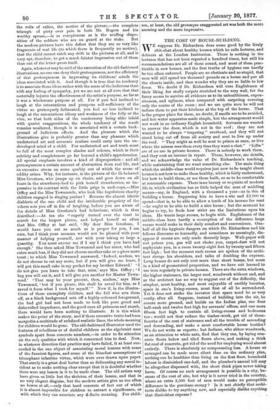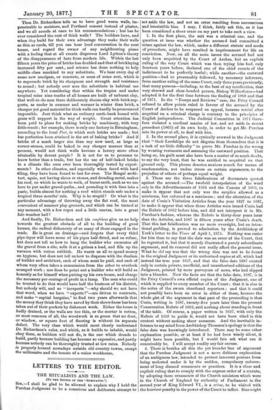THE COST OF HOUSE-BUILDING.
E suppose Dr. Richardson does some good by the lively chit-chat about healthy houses which he calls lectures, and delivers at the London Institution. There is nothing in the lectures that has not been repeated a hundred times, but still his recommendations are all of them sound, and most of them prac- ticable in new houses, and the first truths of hygiene can hardly
be too often enforced. People are so obstinate and so stupid, that men will still spend ten thousand pounds on a house and put all the closets inside, and then wonder why they are so liable to low fever. We doubt if Dr. Richardson will cure Englishmen of their liking for stuffy carpets stretched to the very wall, for the fancy seems to survive all evidence as to its unhealthiness, expen- siveness, and ugliness, when compared with carpeting covering only the centre of the room ; and we are quite sure he will not induce them to put their kitchens at the top of the house. That is the proper place for them, no doubt, if smells are to be avoided, and hot-water apparatus made simple, but the arrangement would not work in an ordinary English household. Servants are wanted to answer the door, which is not in the roof ; they are not wanted to be always " trapesing " overhead, and they will not stand being cut off from all society and sent to live up under the roof. " They might as well be sent to prison at once, as live where the minus sees them every time they want a chat." "Lifts" are of no use in private houses. There is nobody to work them, and they cost an income in repair. These, however, are details, and we acknowledge the value of Dr. Richardson's teaching, while maintaining that we want something else. The main thing which the middle-class world requires just now to be taught about houses is not how to make them healthy, which is fairly understood, but how to build them, or see them built, so as to be comfortable at reasonable expense. There isno luxury or requisite of modern life in which civilisation has so little helped the man of middling means—say, in England, with a thousand a year—as in this of building a house. Supposing him to have a site and £2,000 to spend—that is, to be able to allow a tenth of his income for rent —he ought to be able to build a nice house ; but the moment he begins to try, he finds how strict are the limitations upon his ideas. He wants large rooms, to begin with. Englishmen of the middle-class have hardly a conception of the difference large rooms would make in their daily comfort and convenience. One- half of all the hygienic dangers on which Dr. Richardson and his fellows discourse so learnedly, and sometimes so amusingly, dis- appear if rooms are only made decently large. Wall-paper will not poison you, gas will not choke you, carpet-dust will not asphyxiate you, in a room twenty-eight feet by twenty and fifteen feet high ; but the moment such rooms are spoken of the archi- tect shrugs his shoulders, and talks of doubling the expense. Long beams do not only coat more than short beams, but more in a kind of geometrical proportion, and we have not learned to use iron regularly in private houses. There are the extra windows, the higher staircases, the larger roof, woodwork without end, and as the architect has no way to suggest out of the difficulty, the simplest, most healthy, and most enjoyable of earthly luxuries, space in one's living-rooms, must first of all be surrendered. Yet it does not strike the investor that space need be so very costly, after all. Suppose, instead of building into the air, he covers more ground, and builds on the Indian plan, one floor half-sunk and twelve feet high for servants' offices, and one more fifteen feet high to contain all living-rooms and bedrooms too ; would not that reduce the timber-work, get rid of three- fourths of the cost of staircases and all the trouble of ascending and descending, and make a most comfortable house besides? We do not write as experts ; but Indians, who abhor woodwork, as an attraction to white ants, find that they can, by laying con- crete floors below and tiled floors above, and making a thick flat roof of concrete, get rid of the need for employing wood almost entirely. There is absolutely no compensating loss. A house so arranged can be made more silent than on the ordinary plan, nothing can be healthier than living on the first floor, household labour is diminished one-half, and the plumber's annual bill may be altogether dispensed with, the short thick pipes never taking harm. Of course no such arrangement is possible in a city, be- cause of the cost of site, but why is it never tried in the country, where an extra 2,500 feet of area would make no perceptible difference in the purchase-money ? Is it not chiefly that archi- tects dislike to try anything new, and especially dislike anything
that diminishes expense? _ .
Then Dr. Richardson tells us to have good warm walls, im- penetrable to moisture, and Portland cement instead of plaster, and we all accede at once to his recommendations ; but has he ever considered the coat of thick walls ? 'The builders have, and when they build for their own advantage they make their walls as thin as cards, till you can hear loud conversation in the next house, and regard the owner of any neighbouring piano with a feeling that at all events disproves Lord Lytton's theory of the disappearance of hate from modern life. Within the last fifteen years the price of bricks has doubled and that of bricklaying increased fifty per cent., and science has done nothing to help middle-class mankind to any substitute. We hear every day of some new amalgam, or concrete, or mess of some sort, which is to supersede brick by its cheapness and strength and resistance to sound ; but nobody ever sees the substitute in habitual use anywhere. Yet considering that within the tropics and under -tropical rains nine-tenths of all houses are built of unburnt clay, that well-to-do men there deliberately choose clay with brick sup- ports, as cooler in summer and warmer in winter than brick, a cheaper yet good material for thick walls can hardly be pronounced impossible. Just think what an ordinary earth-bank bound with grass will support in the way of weight. Great attention has been paid to plans for making bricks by machinery, with very little result ; for example, there is only one factory in Birmingham, according to the local Post, in which such bricks are made ; but has perfection been attained in the art of baking bricks? And if bricks of a much larger size than any now used, as large as corner-atones, could be baked in any cheaper manner than at present, would not thick walls become a luxury more often attainable by decent people? It is not for us to presume to know better than a trade, but has the use of half-baked bricks in a climate like ours ever been thoroughly tested by experi- traents ? In other climates, and especially when faced with hard tiling, they have been found to last for ever. The Bengal archi- tect, again, not having slates or stones, and dreading metal, makes his roof, on which he wants to walk, of burnt earth, such as we use here to put under gravel-paths., and pounding it with lime into a paste, builds almost for nothing a roof which stands safe under a tropical three months' rain. Why is he stupid? Or what is the particular advantage of throwing away the flat roof, the most convenient of summer play-grounds, and which can be turned at any moment, with a few ropes and a little canvas, into a great fair-weather hall?
And finally, Dr. Richardson and his confreres give us no help towards the greatest obstacle of all to the building of good houses, the radical dishonesty of so many of those engaged in the trade. He is great on drainage—and forgets that every third pipe-layer will leave some of his pipes half-fitted, and on refuse, but does not tell us how to bang the builder who excavates all the gravel from a site, sells it at a guinea a load, and fills up the vacuum with rotten rubbish. He wants us all to spend money -on hygiene, but does not tell us how to dispense with the dualism of builder and architect, each of whom must be paid, and each of whom very often takes a commission from the other to overlook stamped work ; nor does he point out a builder who will build as honestly as for himself when putting up his own house, and charge the necessary per-tentage of profit in a lump. The man who could be trusted to do that would have half the business of his district, but nobody will, and so " inexperts "—why should we not have that word, when we have " experts ?"—are driven to contracts, and make " capital bargains," to find two years afterwards that the money they think they have saved by their shrewdness has been taken out of their pockets by dishonest work. Either the house is badly drained, or the walls are too thin, or the mortar is rotten, or most common of all, the woodwork is so green that no door, or window, or square foot of flooring is without its separate defect. The very class which would most clearly understand Dr. Richardson's rules, and which, as it builds to inhabit, would obeT them, as builders will not do, is the one which dreads to build, partly because building has become so expensive, and partly because nobody can be thoroughly trusted at low rates. Nobody Is properly housed nowadays outside old country towns, except the millionaire and the inmate of a union workhouse.



































 Previous page
Previous page